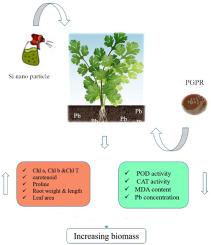Environmental Pollution ( IF 8.9 ) Pub Date : 2020-07-01 , DOI: 10.1016/j.envpol.2020.114982 Hamideh Fatemi 1 , Behrooz Esmaiel Pour 1 , Muhammad Rizwan 2

|
Rapid global industrialization has increased the chances of toxic trace element accumulation in plants and other living things via the food chain. Thus, there is an urgent need to find suitable techniques with the aim to alleviate the stress of toxic trace elements in crops to feed the ever-increasing population with quality food. This research was based on the hypothesis that the growth traits of coriander (Coriandrum sativum L.) plants can be improved by the combined application of lead (Pb) resistant microbes and silicon nanoparticles (Si-NPs) under Pb stress. Two Pb-resistant strains of the microbes were isolated under different Pb concentrations, and then these strains were characterized for different traits. The strains were inoculated in the Pb-spiked (500 mg/kg) soil, and Si-NPs (1.5 mM) were foliar sprayed at different time (three times, two-week interval). The growth and stress tolerance of the plant were assessed by measuring the morphological traits, chlorophyll contents, proline, electrolyte leakage, and enzymatic and non-enzymatic antioxidant activities of the leaves. Results demonstrated that Pb stress had significant negative impacts on all the traits of the coriander. Si-NPs application or bacterial inoculation reversed the Pb-induced toxicities in plants, which was indicated by the improved growth, photosynthesis, and antioxidant enzyme activities of the plants under Pb stress. The effect of the combined use of Si-NPs and microbes was more pronounced than the treatments alone. It can be concluded that Pb-resistant microorganism and Si-NPs could effectively be used to alleviate Pb stress in coriander.
中文翻译:

铅(Pb)耐药微生物的分离和表征以及与硅纳米颗粒的组合使用可改善Pb胁迫下香菜(Coriandrum sativum L.)的生长,光合作用和抗氧化能力。
快速的全球工业化增加了通过食物链在植物和其他生物中有毒微量元素积累的机会。因此,迫切需要找到合适的技术,以减轻作物中有毒微量元素的压力,从而为不断增加的人口提供优质食品。这项研究基于以下假设:香菜(Coriandrum sativum)的生长特性L.)植物可以通过在铅胁迫下联合应用耐铅(Pb)的微生物和硅纳米颗粒(Si-NPs)来改善。在不同的Pb浓度下分离出两个耐Pb的微生物菌株,然后对这些菌株进行了不同性状鉴定。将菌株接种到掺有Pb(500 mg / kg)的土壤中,并在不同时间(三次,两周间隔)进行叶面喷施Si-NPs(1.5 mM)。通过测量叶片的形态特征,叶绿素含量,脯氨酸,电解质泄漏以及酶促和非酶促抗氧化活性,评估了植物的生长和胁迫耐受性。结果表明,铅胁迫对香菜的所有性状均具有显着的负面影响。Si-NPs的施用或细菌接种逆转了Pb诱导的植物毒性,这由Pb胁迫下植物的生长,光合作用和抗氧化酶活性的改善所表明。Si-NP和微生物的组合使用的效果比单独的处理更明显。可以得出结论,抗铅微生物和Si-NPs可以有效地缓解香菜中的铅胁迫。


























 京公网安备 11010802027423号
京公网安备 11010802027423号